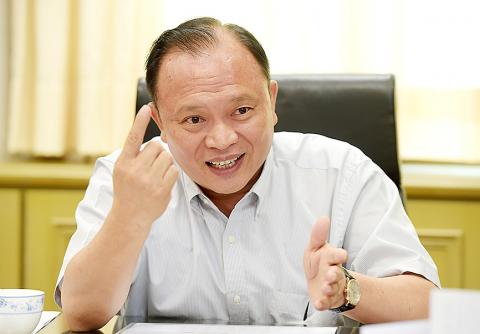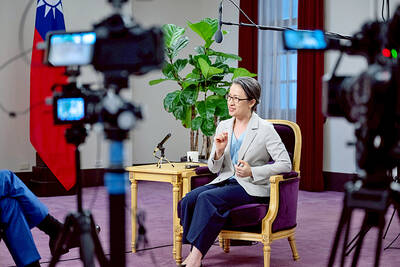Liberty Times (LT): What are the causes of the recurring supply-and-demand imbalance and unstable prices of agricultural produce?
Lin Tsung-hsien (林聰賢): Taiwan’s climate and geographical conditions are both a blessing and a curse. Expansions of area under cultivation, easy-to-grow fruit and vegetables, and agricultural techniques have led to leaps in production volume.
At the same time, climate change has increased the frequency of natural disasters. There are one to three typhoons each year, as well as excessive rainfall and droughts that harm fruit and vegetables. So, when prices for certain fruit and vegetables go up, producers jump on the bandwagon. Production of these crops increases, but their quality suffers. Supply and demand imbalances and price fluctuations go hand-in-hand.

Photo: Huang Yao-cheng, Taipei Times
Take bananas for example. With near-perennial harvests, total area under cultivation increased from 13,788 hectares in 2011 to 16,842 hectares last year. After cold temperatures drove prices up in 2016, production volume rose by 100,000 tonnes.
As for pineapples, total area under cultivation increased from 9,030 hectares in 2011 to 17,090 hectares this year, while production rose from 400,000 tonnes to 580,000 tonnes.
Farmers boost production volumes in hopes of increasing their value. Instead, they are rewarded with falling prices. Notably, many of those who jump on bandwagons are part-time farmers.
For instance, about 3,000 hectares of betel-nut land in Pingtung have been converted to grow low-quality bananas. Such land is usually tended by part-time farmers tempted by good prices. This flooded the market with sub-par quality bananas and prices dropped to unreasonable levels.
To make matters worse, the city and county elections [on Nov. 24] this year are producing a lot of misinformation that are intended to agitate [the public] or promote [China’s] “united front” [tactics]. Fake news about prices collapsing — often accompanied by old photographs or photographs from China — are circulating on the Web. Those exaggerated stories about low-quality produce probably added pressure to prices.
LT: Do you agree with the comments made by Chen Pao-chi (陳保基) when he was the minister of agriculture during the former Chinese Nationalist Party (KMT) administration that it is counterproductive for the government to have fixed-price purchases of produce when prices fall below 95 percent of cost?
Lin: Since 2007, the government has spent NT$1.7 billion (US$55.6 million) on adjusting vegetable and fruit prices, and close to NT$40 billion on natural disaster relief subsidies. Those expenditures are widely panned. There are reports that some farmers intentionally left produce on the field unharvested or refused to switch crops to receive the NT$75,000 per hectare subsidy.
Money only fixes short-term problems, not the long-term problem with the supply and demand structure. It does not help with upgrading the industry and we should not expand it further.
The council protects the livelihood of farmers through disaster relief subsidies, which compensate for 20 percent of cost and help farmers recover land for cultivation. We are working to legislate an agricultural insurance bill to cover the other 80 percent of cost.
A pilot program for grafted Asian pears, mangoes and custard apples has been implemented. Income security and protection against natural disasters would free full-time farmers to focus on improving agricultural techniques and quality.
LT: Many have called for installing an early warning system, but without a legal basis, how can the government ask farmers to pre-register what crops they are growing or plant other crops?
Lin: Without a legal basis, it is indeed difficult to implement a crop registration system across the nation.
The promotion of such policies is currently reliant on local governments and farmers’ associations across the nation. Only 10 percent of the nation’s arable farmland is regularly registered with the government.
The current system of crop evaluation cannot offer accurate forecasts as most takes place after farmers have already seeded their fields.
The council plans to introduce a variety of policies requiring farmers to register such information. We are mulling the viability of a policy that would prioritize farmers’ subsidies and expedite their insurance payments if they are willing to register. They would be asked questions such as what crops they are planting; how much in subsidies they have received for fertilizer or natural disasters; and what type of agricultural insurance they have purchased.
We hope to have more than 30 percent of arable land registered with the system in three years, and hope that the system will actually be able to give farmers a warning of a potential production surplus, adjust production quotas and balance market prices.
At the same time, the council will endeavor to step up its storage capacity, logistics, sales and processing.
With proper storage and refrigeration, agricultural produce will have longer shelf life instead of having to be sold immediately after harvest.
The council is planning to build large refrigeration and logistical warehouses in Taoyuan, Changhua County and Pingtung County. These units and warehouses could also double as a sort of “intermediary.”
While the plan is to establish refrigeration facilities and warehouses over the next three to five years, the council next week will start by assessing storage and refrigeration capacity for all public warehouses, as Premier William Lai (賴清德) has ordered the council to expedite matters.
The short-term goal is to expand these current facilities. When the municipal-run traditional markets in Taichung, Tainan and Kaohsiung start their renovations, we will add refrigeration and warehousing facilities in case there is a production surplus next year.
The council is also seeking to expand channels with which farmers could seek contractual collaborations. This would go in line with the council’s proposed policy of increasing agricultural produce processing, direct selling and exports by 10 percent each.
Regarding the 10 percent export goal, the council is aware that oftentimes Taiwan is unable to offer a steady supply of export-quality produce. As international orders are placed one year in advance, there is the possibility that we might not have enough produce to meet the orders or only have low-quality produce.
We are planning to address such issues by, for example, allocating 10 percent of arable land for bananas for export production, with the council providing assistance to ensure that they are able to meet export orders’ demand for quality and quantity. This way, we can steadily expand our export market and attract more orders.
Taiwanese pineapples, bananas, mangoes, custard apples and guava are all high-quality produce that can be extremely competitive on the international market. We are contemplating taking up contracts for farmers to grow these particular fruits
LT: Pundits and other sources have often labeled certain production and sales groups, as well as certain individuals, as greedy intermediaries hoarding profits. What is your opinion about an organizational restructuring?
Lin: To increase production and sales efficiency, it is vital that we enhance cooperation between local farmers’ associations, local governments, intermediaries and cooperatives. Without all these units working together, it would be impossible to push any reform.
The council is to establish a price task force dedicated to investigating and monitoring price differentials from farm to market. This is to prevent sales intermediaries or agencies from collaborating to collectively lower or raise prices.
While the government has been subsidizing more than 300 farmers’ associations and cooperatives across the nation for many years, their services are limited to their local areas. However, plans to build larger refrigeration and warehousing facilities could serve as a middle ground for producers and consumers. It would also allow for more flexibility in scheduling deliveries.
We have considered the possibility of amending the Agricultural Development Act (農業發展法) to make farmers a “shareholder” of local farmers’ associations, with farmers sharing in the associations’ profits and losses. Such a connection would also help increase production efficiency, as well as provide oversight.
Many of the issues regarding sale and production of agricultural products, as well as reforms addressing such issues, are to be discussed at a national agriculture forum in September. This forum will hopefully prove to be a turning point and boost sales efficiency, raise production prices and increase farmers’ income.
Translated by staff writers Jonathan Chin and Jake Chung

China might accelerate its strategic actions toward Taiwan, the South China Sea and across the first island chain, after the US officially entered a military conflict with Iran, as Beijing would perceive Washington as incapable of fighting a two-front war, a military expert said yesterday. The US’ ongoing conflict with Iran is not merely an act of retaliation or a “delaying tactic,” but a strategic military campaign aimed at dismantling Tehran’s nuclear capabilities and reshaping the regional order in the Middle East, said National Defense University distinguished adjunct lecturer Holmes Liao (廖宏祥), former McDonnell Douglas Aerospace representative in Taiwan. If

TO BE APPEALED: The environment ministry said coal reduction goals had to be reached within two months, which was against the principle of legitimate expectation The Taipei High Administrative Court on Thursday ruled in favor of the Taichung Environmental Protection Bureau in its administrative litigation against the Ministry of Environment for the rescission of a NT$18 million fine (US$609,570) imposed by the bureau on the Taichung Power Plant in 2019 for alleged excess coal power generation. The bureau in November 2019 revised what it said was a “slip of the pen” in the text of the operating permit granted to the plant — which is run by Taiwan Power Co (Taipower) — in October 2017. The permit originally read: “reduce coal use by 40 percent from Jan.

‘SPEY’ REACTION: Beijing said its Eastern Theater Command ‘organized troops to monitor and guard the entire process’ of a Taiwan Strait transit China sent 74 warplanes toward Taiwan between late Thursday and early yesterday, 61 of which crossed the median line in the Taiwan Strait. It was not clear why so many planes were scrambled, said the Ministry of National Defense, which tabulated the flights. The aircraft were sent in two separate tranches, the ministry said. The Ministry of Foreign Affairs on Thursday “confirmed and welcomed” a transit by the British Royal Navy’s HMS Spey, a River-class offshore patrol vessel, through the Taiwan Strait a day earlier. The ship’s transit “once again [reaffirmed the Strait’s] status as international waters,” the foreign ministry said. “Such transits by

Taiwan is doing everything it can to prevent a military conflict with China, including building up asymmetric defense capabilities and fortifying public resilience, Vice President Hsiao Bi-khim (蕭美琴) said in a recent interview. “Everything we are doing is to prevent a conflict from happening, whether it is 2027 or before that or beyond that,” Hsiao told American podcaster Shawn Ryan of the Shawn Ryan Show. She was referring to a timeline cited by several US military and intelligence officials, who said Chinese President Xi Jinping (習近平) had instructed the Chinese People’s Liberation Army to be ready to take military action against Taiwan